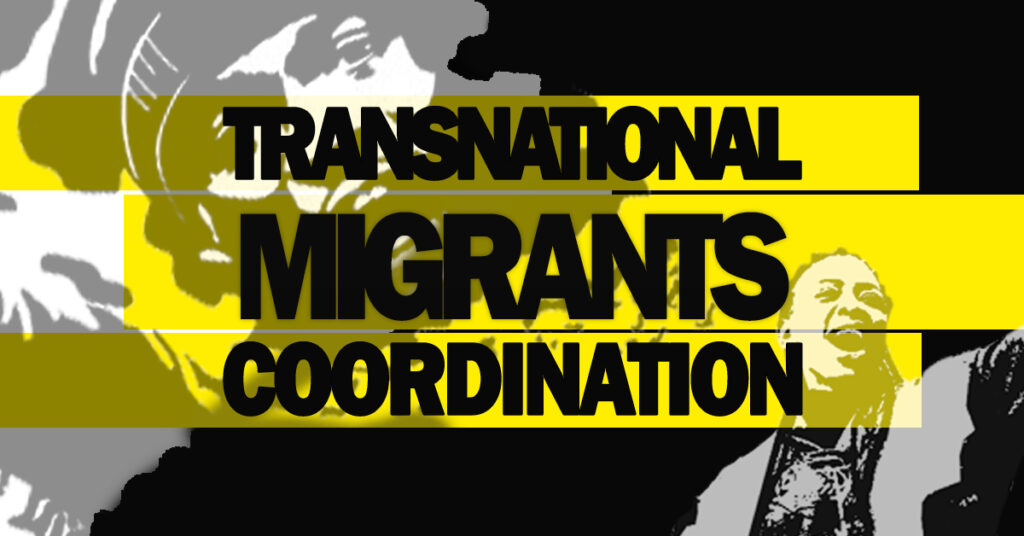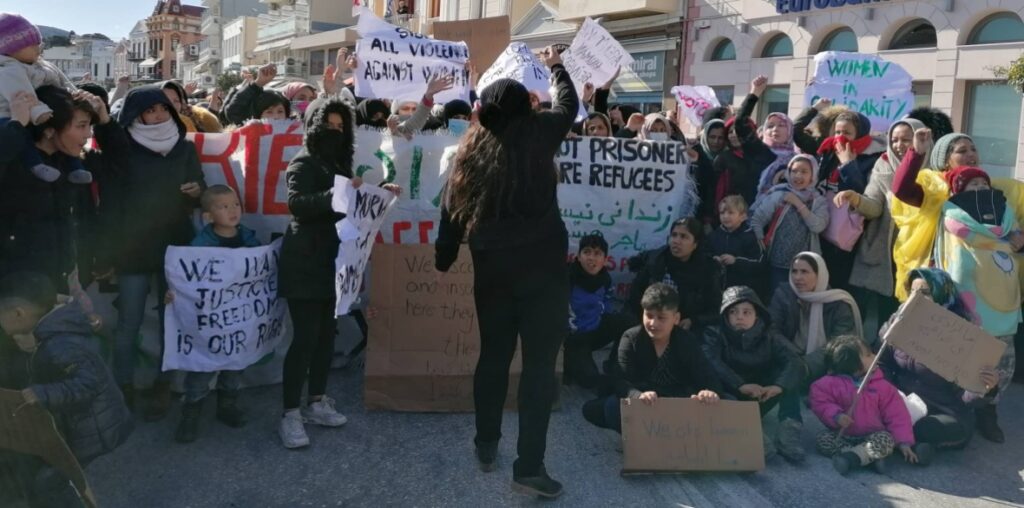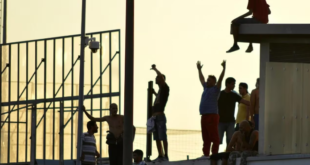
– English translation below
– Traduzione in italiano sotto
Le 8 mars transnationale : la grève féministe des migrant.e.s
Nous sommes les femmes et les personnes LGBTQIA* migrantes, réfugiées, sans papiers, demandeuses d’asile qui, avant et pendant le confinement, ont continué à travailler au cours de la pandémie pour que les besoins fondamentaux puissent être satisfaits. Nous avons été en première ligne dans les hôpitaux, les entrepôts, les services sanitaires, les aides à domicile pour les personnes âgées et les enfants, la vente et la distribution de biens de consommation de base, et pourtant, nos vies ne comptent pas. Cependant, nous savons que si nous nous arrêtons, le monde s’arrête. C’est pourquoi, en tant que Coordination transnationale des migrant.e.s, nous répondons à l‘appel à une grève essentielle le 8 mars. La grève est notre arme pour rejeter et bloquer les leviers d’une société qui nous exploite, nous opprime, nous tue et qui nous tient en chantage avec le permis de séjour. Notre lutte est essentielle et notre grève est essentielle.
Sous le couvert de la pandémie, le lien entre patriarcat et racisme a renforcé son emprise : nos salaires sont restés bas, notre temps a été complètement consacré au travail à l’intérieur et à l’extérieur du foyer, notre santé est toujours mise en danger. C’est pourquoi ces derniers mois de la France aux États-Unis, nous nous sommes élevé.e.s contre les violences racistes et l’exploitation; de l’Espagne à l’Italie et à la Slovénie, nous sommes descendues dans la rue pour demander un permis de séjour européen ; des magasins français Chronopost aux magasins italiens Yoox, nous avons fait la grève contre l’exploitation raciste. Nous n’avons pas accepté de baisser la tête pendant la pandémie et nous ne le ferons pas maintenant pendant la reconstruction !
Même avec des systèmes réglementaires différents, nos vies sont inextricablement liées à nos permis de séjour dans toute l’Europe. Il en va de notre capacité à nous déplacer, à avoir accès à un contrat de travail, à un logement, à des services de santé. Les gouvernements et les patrons européens en sont bien conscients et l’utilisent constamment comme moyen de chantage pour nous faire accepter n’importe quel type de travail. Les bas salaires et les conditions de revenus requises nous poussent à faire plus d’un travail à la fois, ce qui rend très difficile de suivre nos enfants. Les lois migratoires et patriarcales conditionnent nos permis de regroupement familial et nous lient à nos maris, même quand ils sont violents. Avec notre travail domestique, de soins et dans le services, nous assurons le bien-être des pays européens les plus riches. En tant que main-d’œuvre essentielle, nous avons beaucoup donné, mais malgré notre plus grande exposition au virus, nous avons été exclues des prestations de l’État ou même persécutées et entassés dans des centres d’accueil ou des centres de rétentions administratives, même si nous étions enceintes ou si nous avions des enfants. Dans certains pays européens nous avons été régularisées, mais cela n’a toujours été que pour une courte période et avec la contrainte des travaux de soins ou des travaux agricoles. C’est pourquoi nous nous organisons à niveau transnational : fortes des luttes des migrant.e.s, nous ferons grève le 8 mars.
Les femmes migrantes luttent contre le violence patriarcale tous les jours. En quittant nos pays, nous avons refusé non seulement les guerres, la violence patriarcale mais aussi l’exploitation et la misère produites par le capitalisme dans nos pays d’origine. Et nous avons choisi de partir pour chercher de meilleures conditions de vie. Nous refusons qu’à cause de la couleur de notre peau, de notre origine et de nos conditions administratives, les employeurs pensent qu’ils peuvent nous traiter au travail comme des objets sexuels: nous refusons leur harcèlement et leurs insultes. Nous refusons que nos luttes de libération et autodétermination soient utilisées par les discours racistes et islamophobes de la droite nationaliste. Nous refusons de subir des violences à la maison, où beaucoup d’entre nous doivent rester parce que pendant cette crise pandémique, elles ont perdu leur emploi ou parce qu’elles n’ont personne pour s’occuper de leurs enfants. Nous dénonçons la traite des personnes migrantes et l’exploitation de nos corps dans le marché sexuel européen. Forts d’un mouvement mondial de femmes qui, de l’Europe de l’Est à l’Amérique latine en passant par l’Inde, a fait de sa lutte contre la violence patriarcale le levier d’une grève transnationale, nous faisons grève le 8 mars.
Alors que les femmes et les hommes migrant.e.s continuent de défier les frontières militarisées de l’Europe, perdant souvent la vie ou leurs enfants, alors que des milliers d’entre nous sont enfermé.e.s dans des conditions insupportables dans des camps en Grèce, le long de la route des Balkans et dans les centres de détention européens ou dans les pays frontaliers, l’UE prépare des mesures pour organiser la réaction contre notre lutte pour la liberté. La révision du règlement de Dublin et le Nouveau pacte sur la migration et l’aile, proposés par la Commission européenne, ne font que sélectionner hiérarchiquement les migrants aux frontières, améliorer la collaboration entre les États membres pour coordonner notre exploitation, et impliquer tous les pays voisins dans le contrôle de nos vies.
Nous, femmes et les personnes LGBTQIA* migrantes, refusons que notre autonomie, notre mobilité et nos vies soient subordonnées aux exigences économiques européennes et régies par un racisme institutionnel.
Nous, femmes migrantes, nous joignons pour la première fois à un appel transnational à la grève le 8 mars et disons à toutes les femmes : tant que l’imbrication de la violence patriarcale et raciste ne sera pas vaincue, nous ne pourrons pas triompher ensemble. Tant que la liberté des migrant.e.s n’est pas prise par tous et toutes comme un combat général, nous pouvons être ensemble sur les places, mais nous resterons divisés dans les maisons, dans les villes et sur les lieux de travail. C’est pourquoi, le 8 mars, nous nous joignons à la lutte de toutes les femmes contre la violence et l’exploitation patriarcale. C’est pourquoi, le 8 mars, nous demandons un permis de séjour européen illimité et sans conditions, indépendant du travail, des revenus et de la famille, et nous appelons tout le monde à soutenir cette demande.
C’est pourquoi nous appelons chacune et chacun à faire du 8 mars un point de départ pour continuer cette lutte ensemble et à faire de la force transnationale et de la grève un instrument de lutte générale du côté des migrant.e.s.
Coordination Transnationale des Migrant.e.s.
***
The Transnational 8th of March : Migrants Feminist Strike
We are migrant women and LGBTQIA* people, refugees, undocumented and asylum seekers who have been working since before and the beginning of the pandemic, in order to satisfy essential needs. We have been and are at the frontline in hospitals, warehouses, in sanitation services, in care work for the elderly and children, in the selling and distribution of essential commodities, and yet our lives do not count at all. We know that if we stop, the world stops too. Therefore, as the Transnational Migrants’ Coordination, we respond to the call for an essential strike on March 8. The strike is our weapon to reject and break off the levers of the society that exploits, oppresses and kills us, and tries to hold us hostage through the blackmail of the residency permits. Our struggle is essential and our strike is essential.
During the pandemic, the connection between patriarchy and racism has tightened its grip even more: our wages have remained low, our time has been completely devoted to work inside and outside the home, our health is always at risk. This is why in recent months from France to the United States, we have been speaking out against racist violence and exploitation; from Spain to Italy and Slovenia we have taken to the streets to demand a European residence permit, from the French warehouses of Chronopost to the Italian ones of Yoox we have gone on strike against racist exploitation. We did not accept to lower our heads throughout the pandemic, and we will not do it in the course of the approaching reconstruction!
Although with different regulatory systems, everywhere in Europe our life is entirely linked to our residence permit. We depend on it to be able to move around, to have access to a work contract, housing, and health services. European governments and employers are well aware of this and they constantly use it as an instrument of blackmail to push us to accept any kind of work. Low wages and the required income conditions force us to take on several jobs at the same time, making it very hard to take care of our children. Migration and patriarchal laws condition our right and permit to stay through family reunification and chain us to our husbands, even if they are violent. With our domestic, care or service work we support the welfare of the richest European countries. As an essential workforce have contributed enormously; despite our major exposure to the virus, we have been excluded from the state subsidies, we have been persecuted or crammed into reception and detention centers, even if we are pregnant or with children. Even in the countries where we have been regularised, it has only been for a short period of time and only for the sectors of care or agricultural work. On the ground of this, we organize transnationally, with the power of migrant struggles, we will strike on March 8.
Migrant women are struggling against violence everyday. When we left our countries, we rejected not only wars, patriarchal violence, but also the exploitation and misery produced by capitalism in our countries of origin. And we chose to leave in search of better living conditions. On account of our black skin, our origins or our administrative conditions, employers think they can treat us as sexual objects at work: we refuse their harassment and insults. We refuse to allow our struggles of liberation and self-determination to be used by the racist and islamofobic rhetoric of the nationalist right. We refuse to be subjected to violence at home, where many of us are forced to stay during the pandemic crisis because we have lost our jobs or because we have no one else to take care of our children. We denounce human trafficking and the exploitation of our bodies in the European sex market. With the strength of a global women’s movement that, from Eastern Europe to Latin America to India, has made its fight against patriarchal violence the base of an essential transnational strike, we will strike on March 8.
While migrant women and men continue to defy the militarised borders of Europe, often losing their lives or their children, while thousands of us are locked up in unbearable conditions in the camps in Greece, along the Balkan Route, or in european detention centers and in bordering countries, the European Union prepares measures and resources to organise the reaction against our struggle for freedom. The revision of the Dublin Regulation and the New Pact on Migration and Asylum, proposed by the European Commission, do nothing but hierarchically select migrants at the borders, improve the cooperation between the Member States in correlating our exploitation and expulsion of those who are not needed and involve all the neighbouring countries in the control of our lives.
We, migrant women and LGBTQIA* people, refuse that our autonomy, our mobility, and our lives are subordinated to European economic needs and governed by institutional racism.
For the first time, we migrant women are uniting with a transnational call for the strike of March 8, and we speak to all women: up until the intertwining of patriarchal and racist violence is defeated, we cannot triumph together. Till migrants’ freedom is not assumed by everyone as a collective struggle, we can take it to the streets together, but we will remain divided in our houses, in the cities and in the workplaces. For that reason, on March 8 we have joined the struggle of all women against patriarchal violence and exploitation. Thereby, on March 8 we claim an unlimited and unconditional European residence permit, independent from work, income and family and we call everyone to support this claim.
That is why we invite all men and women to make March 8 the starting point to continue together this struggle and to create out the transnational strength of the strike as an instrument of common struggle on the side of migrants.
Transnational Migrants’ Coordination
***
L’8 marzo transnazionale: lo sciopero femminista delle e dei migranti
Siamo le donne e le persone LGBTQIA* migranti, rifugiate, senza documenti e richiedenti asilo che lavoravano prima e hanno continuato a lavorare dall’inizio della pandemia affinché i bisogni essenziali venissero soddisfatti. Siamo state e siamo in prima linea negli ospedali, nei magazzini, nei servizi di sanificazione, nell’assistenza ad anziani e bambini, nella vendita e nella distribuzione dei beni di consumo primari, eppure, le nostre vite non contano. Sappiamo però che se ci fermiamo noi, si ferma il mondo. Per questo, come Coordinamento Transnazionale delle e dei Migranti, rispondiamo alla chiamata per uno sciopero essenziale il prossimo 8 Marzo. Lo sciopero è la nostra arma per rifiutare e bloccare le leve di una società che ci sfrutta, ci opprime e ci uccide, e che cerca di tenerci in ostaggio attraverso il ricatto del permesso di soggiorno. La nostra lotta è essenziale e il nostro sciopero è essenziale.
Durante la pandemia, il legame fra razzismo patriarcato e razzismo ha stretto ancora di più la sua morsa: i nostri salari sono rimasti bassi, il nostro tempo è stato completamente devoluto al lavoro dentro e fuori dalla casa, la nostra salute è sempre a rischio. Per questo motivo negli ultimi mesi, dalla Francia agli Stati Uniti, abbiamo preso parola contro la violenza razzista e lo sfruttamento; dalla Spagna all’Italia e alla Slovenia siamo scese in piazza per rivendicare un permesso di soggiorno europeo, dai magazzini francesi di Chronopost a quelli italiani di Yoox abbiamo scioperato contro lo sfruttamento razzista. Non abbiamo accettato di abbassare la testa durante la pandemia e non lo faremo nemmeno adesso durante la ricostruzione!
Anche se con sistemi normativi differenti, in tutta Europa la nostra vita è legata a doppio filo al permesso di soggiorno. Da esso dipende la possibilità di muoverci, avere accesso a un contratto di lavoro, a una casa, ai servizi sanitari. I governi europei e i padroni lo sanno bene e per questo lo usano costantemente come ricatto per farci accettare qualsiasi lavoro. I bassi salari e le condizioni di reddito richieste ci costringono a fare più lavori contemporaneamente, rendendo difficile star dietro ai nostri figli. Le leggi patriarcali e sulla migrazione condizionano il nostro diritto e il permesso di rimanere attraverso il ricongiungimento famigliare e ci incatenano ai nostri mariti, anche se sono violenti. Con il nostro lavoro domestico, di cura o nei servizi sosteniamo il welfare dei paesi europei più ricchi. Come forza-lavoro essenziale abbiamo dato molto, ma nonostante la nostra maggiore esposizione al virus, siamo state escluse dai sussidi statali o siamo state ammassate nei centri di accoglienza e di detenzione, anche se incinte o con dei bambini. Anche nei paesi in cui abbiamo ottenuto la regolarizzazione, è stato sempre e soltanto per tempi brevi e con il vincolo al lavoro di cura o al lavoro agricolo. Per questo motivo, ci organizziamo a livello transnazionale e, forti delle lotte delle e dei migranti, l’8 Marzo scioperiamo.
Le donne migranti lottano contro la violenza tutti i giorni. Quando lasciamo i nostri paesi, non rifiutiamo solamente le guerre e la violenza patriarcale, ma anche lo sfruttamento e la miseria prodotti dal capitalismo nei nostri paesi d’origine. e scegliamo di migrare per cercare delle condizioni di vita migliori. Per la nostra pelle nera, le nostre origini o la nostra condizione amministrativa, i padroni pensano di poterci trattare come oggetti sessuali al lavoro: rifiutiamo le loro molestie e insulti. Rifiutiamo che le nostre lotte di liberazione e auto-determinazione siano strumentalizzate dai discorsi razzisti e islamofobi della destra nazionalista. rifiutiamo di subire la violenza a casa, dove molte di noi sono costrette a rimanere durante la crisi pandemica perché abbiamo perso il lavoro o perché non abbiamo nessun’altro che possa prendersi cura dei nostri figli. Denunciamo la tratta e lo sfruttamento dei nostri corpi sul mercato del sesso europeo. Forti di un movimento globale delle donne che, dall’Est Europa all’America Latina all’India, ha fatto della sua lotta contro la violenza maschile la leva di uno sciopero essenziale transnazionale, noi l’8 marzo scioperiamo.
Mentre le donne e gli uomini migranti continuano a sfidare le frontiere militarizzate dell’Europa, spesso perdendo la vita o i figli, mentre in migliaia siamo rinchiusi in condizioni insostenibili nei campi in Grecia, lungo la rotta balcanica o nei centri di detenzione in Europa e nei paesi confinanti, l’Unione Europea prepara misure e risorse per organizzare la reazione contro la nostra lotta per la libertà. Il nuovo Patto su Migrazione e l’Asilo, proposto dalla Commissione Europea non fa altro che selezionare in modo gerarchico i e le migranti alle frontiere e migliorare la collaborazione fra Stati membri per coordinare il nostro sfruttamento, l’espulsione di chi non serve e coinvolgere tutti i paesi confinanti nella lotta contro i migranti.
Noi, donne e persone LGBTQIA* migranti rifiutiamo che la nostra autonomia, la nostra mobilità e le nostre vite siano subordinate alle esigenze economiche europee e governate dal razzismo istituzionale. Noi donne migranti ci uniamo per la prima volta con un appello transnazionale allo sciopero dell’8 marzo e diciamo a tutte le donne: finché l’intreccio tra violenza patriarcale e violenza razzista non sarà sconfitto, non potremo trionfare insieme. Finché la libertà dei migranti non sarà assunta da tutte e tutti come una battaglia generale, potremmo essere insieme nelle piazze, ma rimarremo divise e frammentate nelle case, nelle città e nei posti di lavoro. Per questo, l’8 marzo ci uniamo alla lotta di tutte le donne contro la violenza patriarcale e lo sfruttamento. Per questo, noi l’8 marzo rivendichiamo un permesso di soggiorno europeo illimitato e senza condizioni, svincolato dal lavoro, dal reddito e dalla famiglia e invitiamo tutte a sostenere questa rivendicazione.
Per questo, invitiamo tutte e tutti a fare dell’8 marzo un punto di partenza per continuare insieme questa lotta e fare della forza transnazionale e dello sciopero uno strumento di lotta generale dalla parte dei migranti e delle migranti.
Coordinamento Transnazionale delle e dei Migranti
***
8 من مارس يوم عابر للحدود: إضراب للمهاجرين نساء ورجالا
نحن النساء المهاجرات واللاجئات وطالبات اللجوء والمهاجرات السريات , ومن له توجه جنسي غير معياري LGBTQIA* , واصلنا العمل أثناء الحجر الصحي وقبله, تلبية للحاجيات الأساسية,.تواجدنا بالخطوط الأمامية داخل المستشفيات والمستودعات والخدمات الصحية ورعاية كبار السن والأطفال، وتوزيع مواد الاستهلاك الأساسية، لكن رغم كل هذا حياتنا غير مهمة
نعلم بتوقفنا يتوقف العالم ,وهو ما جعل تنسيق المهاجرين العابر للحدود ، يستجيب لدعوة الاضراب الاساسي في 8 من مارس
الإضراب سلاحنا لرفض الاستغلال والاضطهاد و مجتمع يسعى لقتلنا وابتزازنا برخصة الإقامة
نضالنا أساسي وإضرابنا أساسي
.تحت غطاء الوباء ، أحكم الترابط البطريركي العنصري قبضته : ظلت أجورنا منخفضة ، ووقتنا الكامل في العمل داخل المنزل وخارجه ، و صحتنا عرضة للخطر
لهذه الاسباب ,خلال الأشهر الأخيرة ,انتفضنا ضد الاستغلال و العنف العنصري ,من فرنسا إلى الولايات المتحدة,. ، نزلنا الشوارع بإسبانيا وإيطاليا وسلوفينيا للمطالبة بتصريح إقامة أوروبي ؛ أضربنا ضد الاستغلال العنصري من متاجر كرونوبوست Chronopost الفرنسية إلى متاجر يوكس Yoox الإيطالية ، رفضنا الانحناء أثناء الوباء ولن نفعل مع إعادة البناء
رغم اختلاف القوانين التنظيمية بكل أنحاء أوروبا. ،تبقى حياتنا مرتبطة بتصاريح الإقامة, :من القدرة على التنقل ، والحصول على عقد عمل ، الى الإسكان والخدمات الصحية
تدرك الحكومات الأوروبية وأرباب العمل هذه الامور بشكل جيدً ,تستخدمها كوسيلة للابتزاز وفرض قبول أي نوع من الوظائف بأجور منخفضة وشروط مزرية. , وهو ما يدفع للقيام بأكثر من وظيفة في ان واحد ، ويجعل مواكبة أطفالنا امر صعب
تشترط قوانين الهجرة والقوانين الأبوية ,الارتباط بالزوج ,ولوكان عنيفا , للحصول على تصاريح التجمع الأسري., بذلنا الجهود وقدمنا الكثير ,كيد عاملة أساسية في العمل المنزلي وأعمال الرعاية والخدمات, لضمان رفاهية أغنى الدول الأوروبية. ، تعرضنا للفيروس بشكل متزايد حرمنا من مساعدات الدولة ,حشرنا بمراكز الاستقبال و مراكز الاحتجاز. دون مراعاة اوضاع النساء الحوامل و من لهن أطفال
تمت تسوية أوضاعنا ببعض البلدان الأوروبية ، بسبب إكراه نقص اليد العاملة في أعمال الرعاية و الزراعة. لكن هذه التسوية لا تدوم طويلا , وهو ما جعلنا ننتظم على مستوى عابر للحدود, نخوض إضراب 8 من مارس. ونحن أقوياء
كل يوم نناضل كنساء مهاجرات ضد العنف البطريركي. فمغادرة بلداننا، ليس رفضا للحروب والعنف البطريركي فقط، بل رفض للاستغلال والبؤس الذي أحدثته الرأسمالية داخل بلداننا الأصلية ,وهو ما جعلنا نختار الهجرة للبحث عن شروط معيشية أفضل
نرفض اعتبارنا داخل أماكن العمل كمواضيع جنسية, بسبب لون بشرتنا وأصلنا وأوضاعنا الإدارية: نرفض مضايقة وتحرشات أرباب العمل وإهاناتهم
نرفض استخدام نضالاتنا للتحرر وتقرير المصير من قبل الخطاب العنصري والإسلامفوبيا لليمين القومي. نرفض العنف الاسري و، الاضطرار للبقاء في المنازل بسبب فقدان الوظيفة أو غياب من يقوم برعاية الاطفال , في ظل الازمة الصحية , نشجب الاتجار في النساء المهاجرات واستغلال أجسادنا داخل سوق الدعارة الأوروبية
بدعم من حركة النساء العالمية ، داخل أوروبا الشرقية وأمريكا اللاتينية مرورا بالهند ، المعركة ضد العنف البطريركي رافعة للإضراب العابر للحدود ، إضراب 8 من مارس
في الوقت الذي يعمل فيه المهاجرون نساء ورجالا ,على تحدي الحدود الاوروبية المعسكرة , يفقدون حياتهم و أطفالهم ،و يحبس الآلاف داخل مخيمات اليونان ،وعلى طول شريط البلقان و بمراكز الاحتجاز الأوروبية أو داخل البلدان الحدودية ، يستعد الاتحاد الأوروبي لمواجهة نضالنا كنضالات من أجل الحرية
إن مراجعة قانون دبلن والميثاق الجديد بشأن الهجرة والتعديلات ، التي اقترحتها المفوضية الأوروبية ، لا يمكن لكل هذا الا اختيار المهاجرين على الحدود بشكل هرمي ، و تنسيق التعاون بين الدول الأعضاء بهدف استغلالنا ، وإشراك جميع البلدان المجاورة للسيطرة على حياتنا
نحن النساء المهاجرات و كل من له توجه جنسي غير معياريLGBTQIA* ، نرفض خضوع حياتنا واستقلاليتنا و حقنا في التنقل, للشروط الاقتصادية الأوروبية , المحكومة بالعنصرية المؤسسية
نحن ، النساء المهاجرات ، ننضم ولأول مرة للنداء العابر للحدود , نخوض إضراب 8 من مارس, نقول للنساء جميعا: طالما لم نهزم ترابط العنف البطريركي العنصري ، لا يمكن الانتصار معًا, طالما لا يعتبر الجميع حرية المهاجرين نضالا عامًا، ونكون في الساحات معا ، سنبقى منقسمين بالمنازل والمدن وداخل أماكن العمل
لهذا السبب، سننضم في 8 من مارس للنضال, ضد العنف والاستغلال الأبوي
لهذا السبب، سنطالب في 8 من مارس ، بتصريح إقامة أوروبي غير محدود وغير مشروط ،بالعمل والدخل والأسرة ، وندعو الجميع لدعم هذا الطلب
لهذا السبب ندعو الجميع لجعل 8 من مارس نقطة انطلاق, ومواصلة النضال , وجعل القوة العابرة للحدود والاضراب أداة للنضال العام إلى جانب المهاجرين والمهاجرات
تنسيق المهاجرين العابر للحدود

 Coordinamento Migranti Il Coordinamento migranti Bologna e provincia è nato nel 2004.
Coordinamento Migranti Il Coordinamento migranti Bologna e provincia è nato nel 2004.



